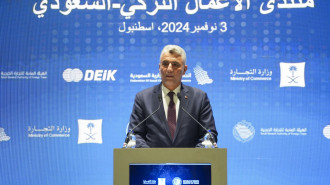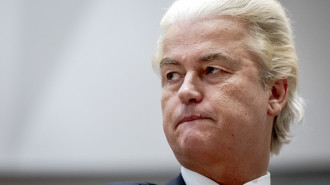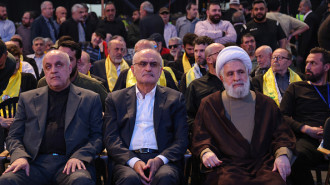Follow us on Facebook, Twitter and Instagram to stay connected
Israel is a 'non-democratic apartheid regime', admits Israeli rights watchdog B'Tselem
B'Tselem, an Israeli group that monitors rights abuses, made the bold announcement that Israel enforces an apartheid system "from the Jordan River to the Mediterranean Sea" in a position paper this week, The Guardian reported on Tuesday.
It states that "one organising principle lies at the base of a wide array of Israeli policies: advancing and perpetuating the supremacy of one group - Jews - over another - Palestinians".
The description of Israel as an "apartheid state" has been repeatedly made by Palestinian and international activists in the past, but the report by B'tselem - viewed as a more mainstream Israeli organisation - represents a rare Israeli admission of these claims.
Most damaging for the Israeli government's reputation is B'tselem's statement that it is not just Palestinians in the occupied West Bank who are subjected to an apartheid system, but also Palestinian citizens of Israel.
The latter claim is a sensitive one for Israel, which prides itself on being the "Middle East's only democracy" - a title rejected by many activist groups who say that Palestinian citizens of Israel have far fewer rights than Jewish ones.
The 2018 "Jewish Nation State Law" was also used by critics as further evidence the Israeli government was undermining the rights and agency of Palestinian citizens.
|
|
The B'Tselem report stated that Jewish citizens have full rights within Israel and areas under its control. The rights of Palestinians are divided into four categories with even the highest of these below those Jewish-Israelis.
"Israel is not a democracy that has a temporary occupation attached to it," B'Tselem, executive director, Hagai El-Ad told The Guardian.
"It is one regime between the Jordan River to the Mediterranean Sea, and we must look at the full picture and see it for what it is: apartheid."
Israel has been criticised for its illegal annexation of territories in the occupied West Bank, where Palestinians suffer a lost list of abuses, according to human rights groups.
Forty-seven UN experts said the annexation, later put on hold, "would be the crystallisation of an already unjust reality: two peoples living in the same space, ruled by the same state, but with profoundly unequal rights... This is a vision of a 21st-century apartheid", the British daily reported.
Ohad Zemet, a spokesperson for Israel's ambassador to the UK hit out at the claims in the B'tselem report, describing it as a "propaganda tool".
"Israel rejects the false claims in the so-called report as it is not based on reality but on a distorted ideological view," Zemet said.
In an op-ed for The Guardian on Tuesday, Hagai El-Ad, executive director of B'Tselem defended the report.
"One cannot live a single day in Israel-Palestine without the sense that this place is constantly being engineered to privilege one people, and one people only: the Jewish people," El-Ad wrote.
"Yet half of those living between the Jordan River and the Mediterranean Sea are Palestinian. The chasm between these lived realities fills the air, bleeds, is everywhere on this land."
In a statement sent by email, El-Ad said the report was based on hard facts, and was not done in haste.
"Apartheid is not set in stone: It’s a regime created by people, and people can change it too. It is, however, difficult – impossible – to change reality if one refrains from calling things by their proper name. Apartheid," El-Ad wrote.
"The sober, accurate, and timely look at this reality is a moment of hope, a call for change towards a future of justice, equality and rights - a future that will come."







 Follow the Middle East's top stories in English at The New Arab on Google News
Follow the Middle East's top stories in English at The New Arab on Google News


